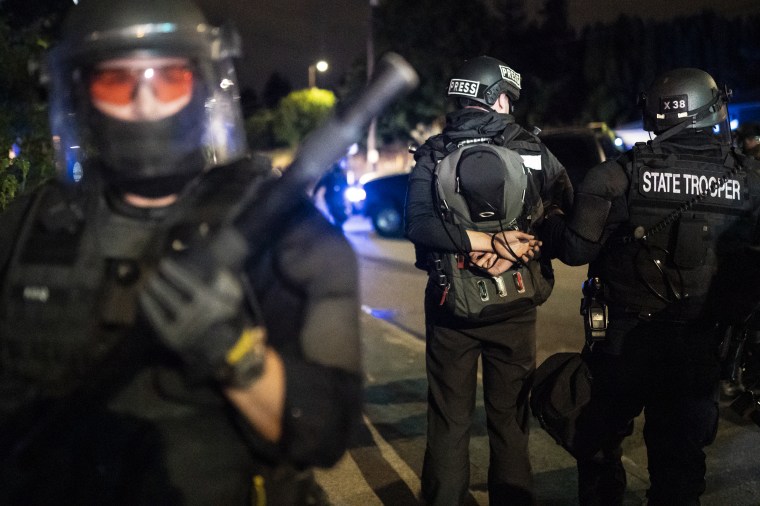The Torch is a weekly newsletter from the Committee to Protect Journalists that brings you the latest press freedom and journalist safety news from around the world. Subscribe here.
Journalists from foreign outlets spoke to CPJ about their concerns covering the U.S. elections, which are exacerbated by COVID-19, curtailed campaigns, civil unrest, visa issues, and an unpredictable political environment. CPJ’s Deputy Executive Director Robert Mahoney called the Trump administration’s plans to restrict foreign journalist visas “chilling,” warning they could “invite similarly restrictive moves by authoritarian governments around the world that are only too glad to cite the United States as a pretext.” CPJ joined 35 media organizations to formally protest the proposed revisions.
Also in the U.S., Michael Pack, head of the United States Agency for Global Media, which oversees Voice of America, moved to eliminate a regulation designed to protect editorial independence for the USAGM agency’s networks, including Voice of America. “Although legal safeguards to the news networks’ independence remain in place, this move risks undermining the networks’ credibility and could further endanger the safety of its journalists,” said CPJ Program Director Carlos Martínez de la Serna.
Journalists covering the election are encouraged to use and to share the free physical safety, digital security, and legal resources on CPJ’s #PressSafety2020 page. If you have any questions about safely reporting on the elections, contact electionsafety@cpj.org
In Nigeria, journalists are confronting violence while covering protests. Since October 5, police and unidentified people have attacked at least 12 journalists covering demonstrations against police brutality, and at least five news outlets have been attacked. During separate protests in the country over an increase in fuel and electricity tariffs, police injured a photojournalist.
Global press freedom updates
- Hungarian police question journalists for ‘illicit data collection’ after use of drone footage
- Syrian journalist Rasheed Bakr killed in an airstrike in Idlib
- CPJ spoke to Egyptian journalist Nora Younis, editor-in-chief of Al-Manassa, about censorship in Egypt
- Kurdish Iraqi security forces arrest journalist Guhdar Zebari at his home in Akre
- Israeli forces arrest Palestinian filmmaker Abdulrahman Thaher at his home in Nablus
- Iraqi judge issues an arrest warrant for a Middle East Eye journalist
- Turkish courts pursue trials, asset seizures in multiple cases against journalists
- Reporter arrested in Bangladesh sedition case
- Kazakh police assault, injure a journalist covering protests
- Russian journalist Irina Slavina dies of self-immolation after harassment by authorities
- Colombia to file criminal charges against journalist Diana Díaz for revealing censorship at public media network
- Angolan police detain, harass, and beat journalists covering protests
Spotlight

Fragile gains toward reducing the murders of journalists worldwide could be thwarted by legal appeals and lack of political leadership, CPJ found in its latest edition of the Global Impunity Index, published this week. The Index spotlights countries where journalists are slain and their killers go free and is published annually ahead of the International Day to End Impunity for Crimes Against Journalists on November 2. In 83% of murders of journalists in the last decade, their killers went free.
The One Free Press coalition this week highlighted 10 urgent cases of impunity around the world, including several from countries on CPJ’s index: Philippines, Mexico, India, South Sudan, and Russia. Learn more about these journalists here.
UNESCO and the International Center for Journalists are collecting data on online threats to female journalists. The data will help inform solutions to the endemic problem of online harassment globally. If you are interested in sharing your experiences, fill out the survey here. Meanwhile, the International Women’s Media Foundation and the Knight Center for Journalism in the Americas are hosting an online open course (or MOOC), “Online Harassment: Strategies for Journalists’ Defense,” from November 16 to December 13. The free course is open for women journalists and allies.
A closer look | CPJ’s most-read features in October
- Ahead of elections, Tanzania’s regulator is used as a cudgel against the media
- Germany revisits influential internet law as amendment raises privacy implications
- Q&A: Financial Times reporters Dan McCrum and Stefania Palma on Wirecard and pressures on business journalists
- Conspiracy theories grow in the U.S., creating threats to journalist safety
What we are reading
- Syrian journalists in Idlib face crackdown from jihadist-affiliated government — Al-Monitor
- A life under lockdown, through the eyes of Kashmir’s cartoonists — Majid Maqbool, The New Humanitarian
- No matter who wins the US election, the world’s ‘fake news’ problem is here to stay — Eliza Mackintosh, CNN
- U.S. Lawmakers Want to Protect Local Newspapers From Google, Facebook — Keach Hagey, The Wall Street Journal [Paywall]
Do you have an Amazon Alexa-enabled device? Enable CPJ's flash briefing skill to stay up to date with the latest press freedom news from around the world.
